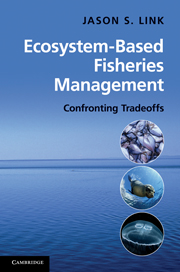Part III - Institutional considerations
Published online by Cambridge University Press: 05 June 2012
Summary
The prior section provided an introduction into the technical aspects of how one might assess and evaluate the status of an ecosystem. But then what? Say that one monitors and measures several features of an ecosystem, calculates fisheries independent and dependent indicators, and then models a range of processes and factors. What would one then do with such output? Where would one present those outputs and how would decisions be based on that information? In this section I aim to address questions such as these.
The first chapter in this section explores those facets of the socioeconomic context within which fisheries operate. Understanding and characterizing the salient features of any given fishery is a requisite basis for managing that fishery. The next chapter explores governance and management institutions. There I explore the need for such institutions, what roles such institutions should play, and what some desirable features of such institutions might be.
The last chapter in this section attempts to tie the entire book together by discussing a process that explicitly addresses and explores tradeoffs. The emphasis is on a process that recognizes the difference between negotiable and nonnegotiable goals, a process such as MSE that then primarily explores allocation options among the negotiable goals. How the quantitative information is used is discussed there specifically in terms of an operating model, though it is understood to inform the entire process.
Again, my point here (as in the entire book) is to be illustrative, not exhaustive, on the subject.
- Type
- Chapter
- Information
- Ecosystem-Based Fisheries ManagementConfronting Tradeoffs, pp. 131 - 132Publisher: Cambridge University PressPrint publication year: 2010



